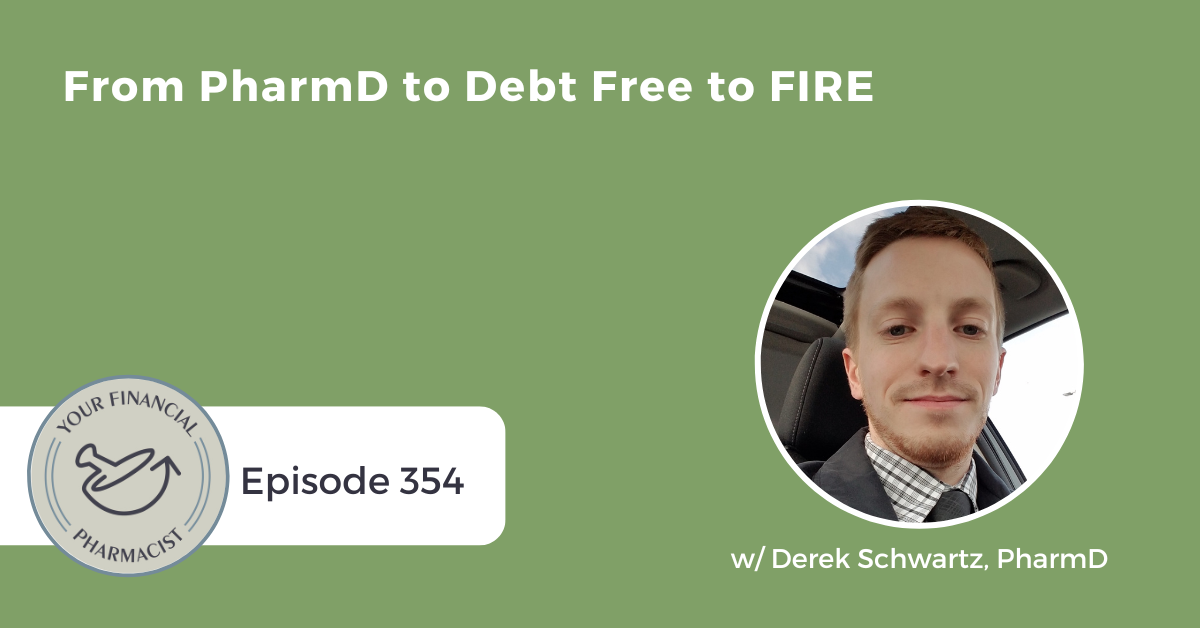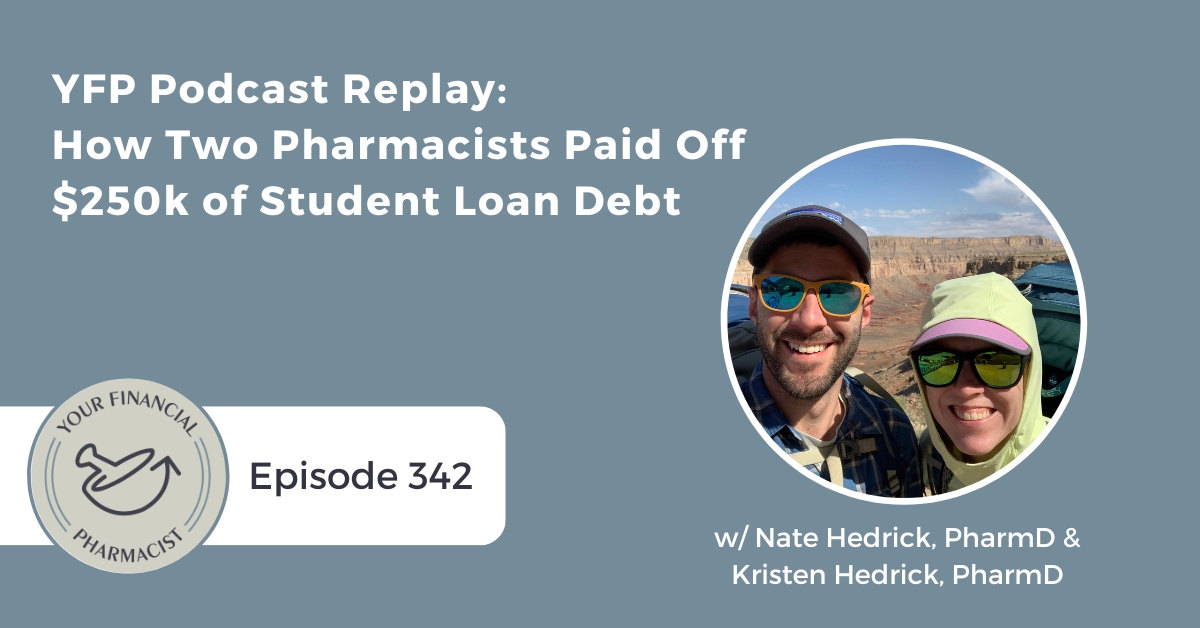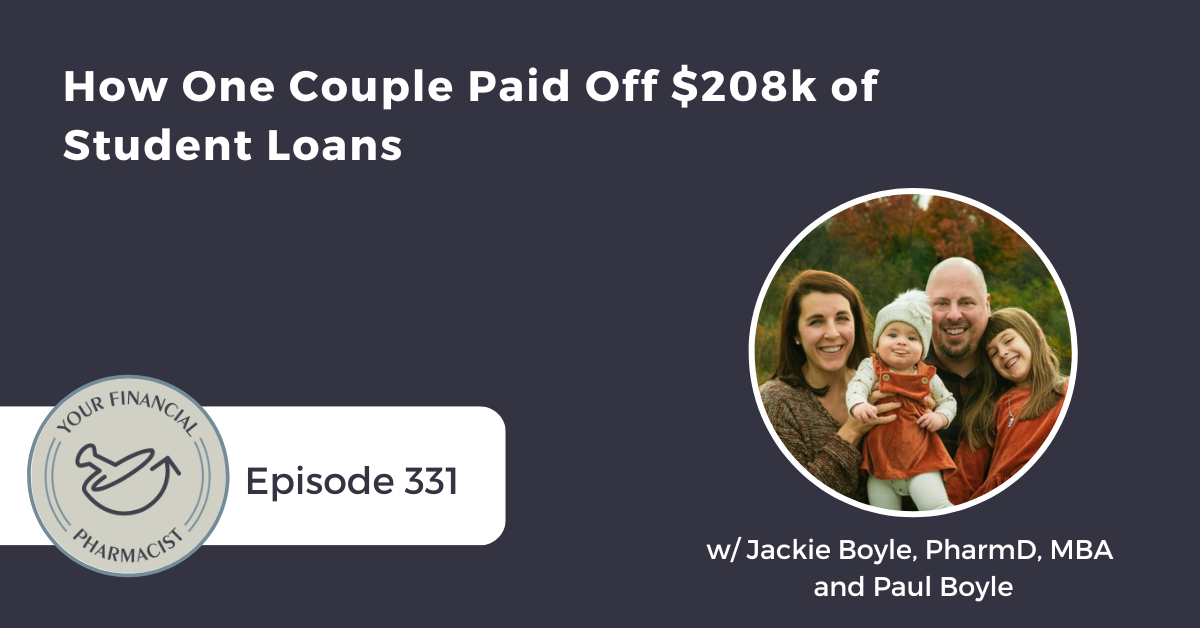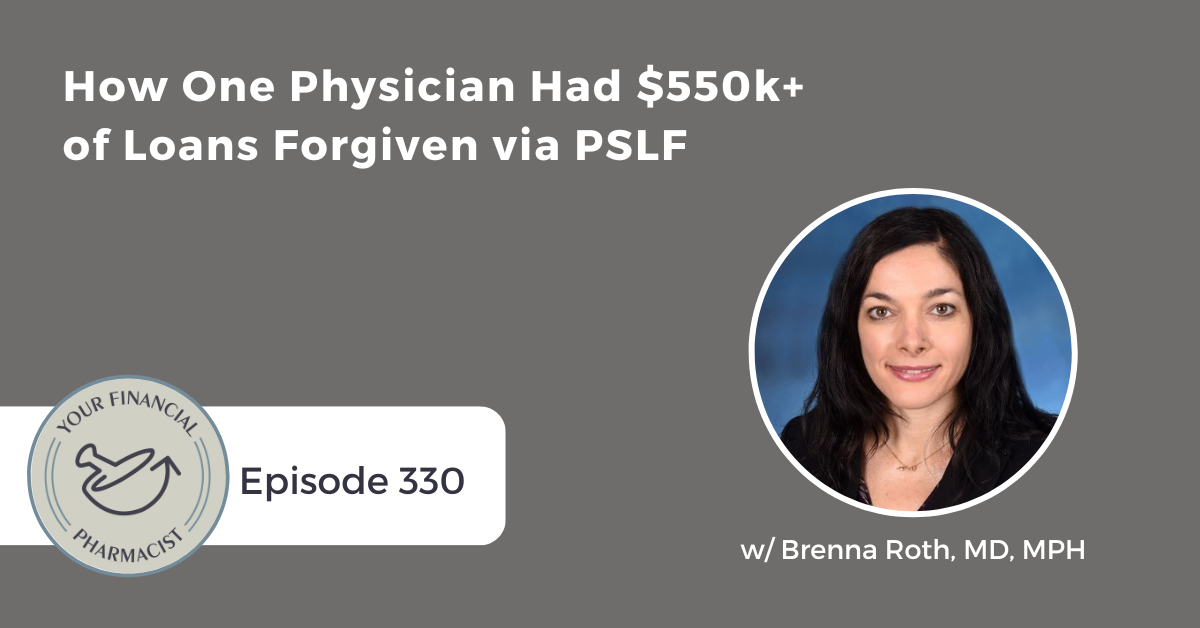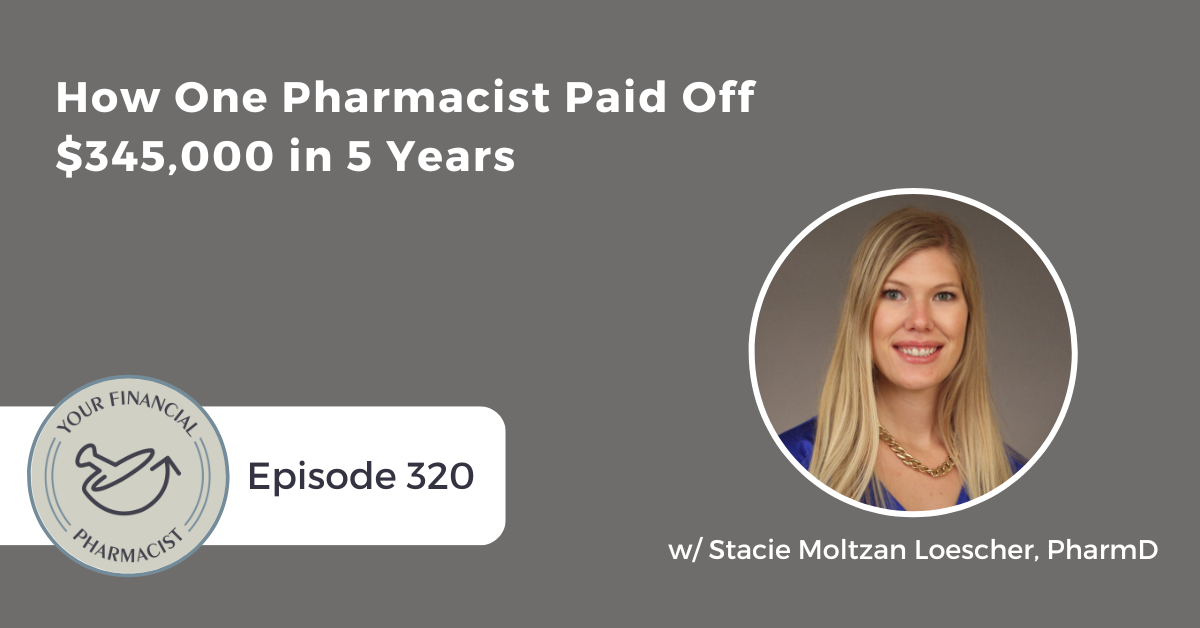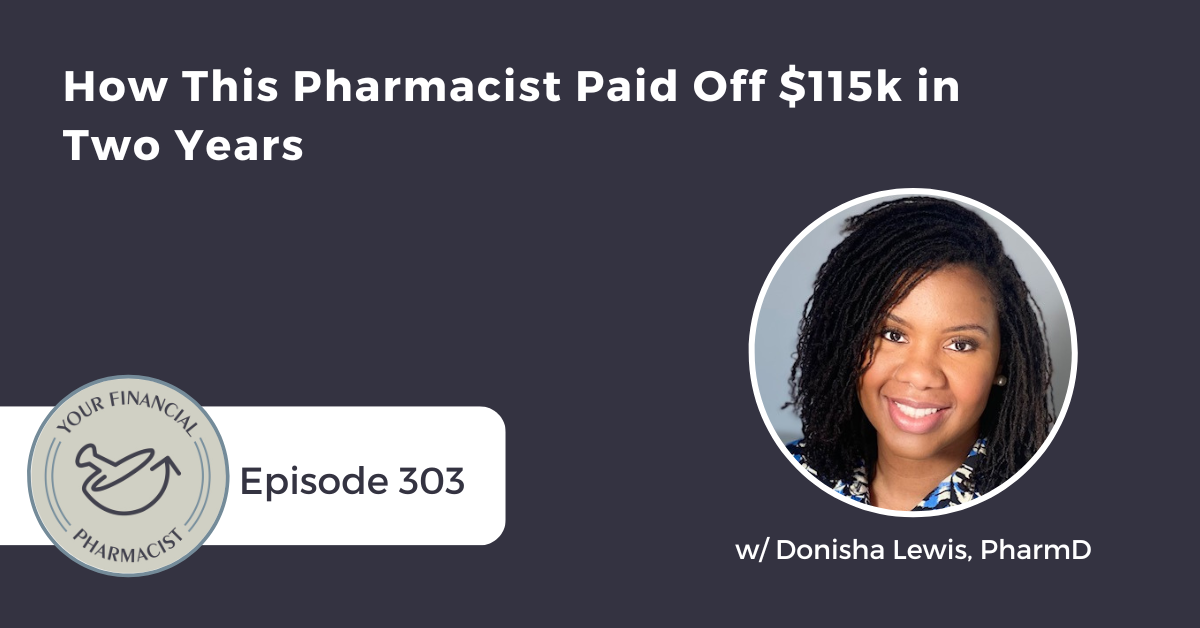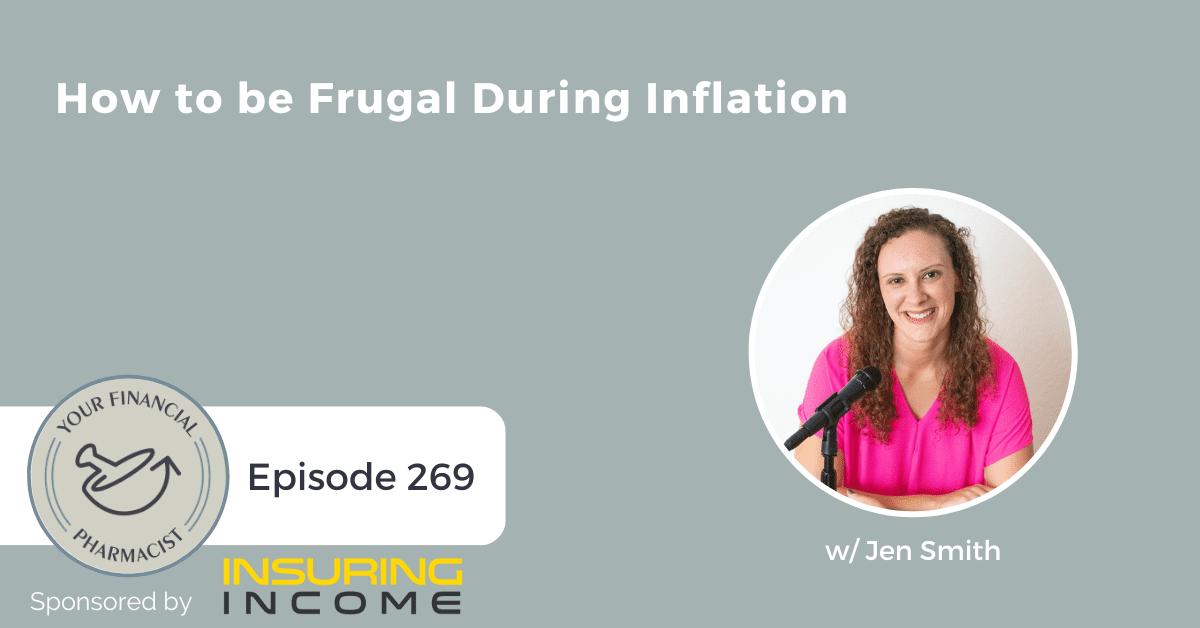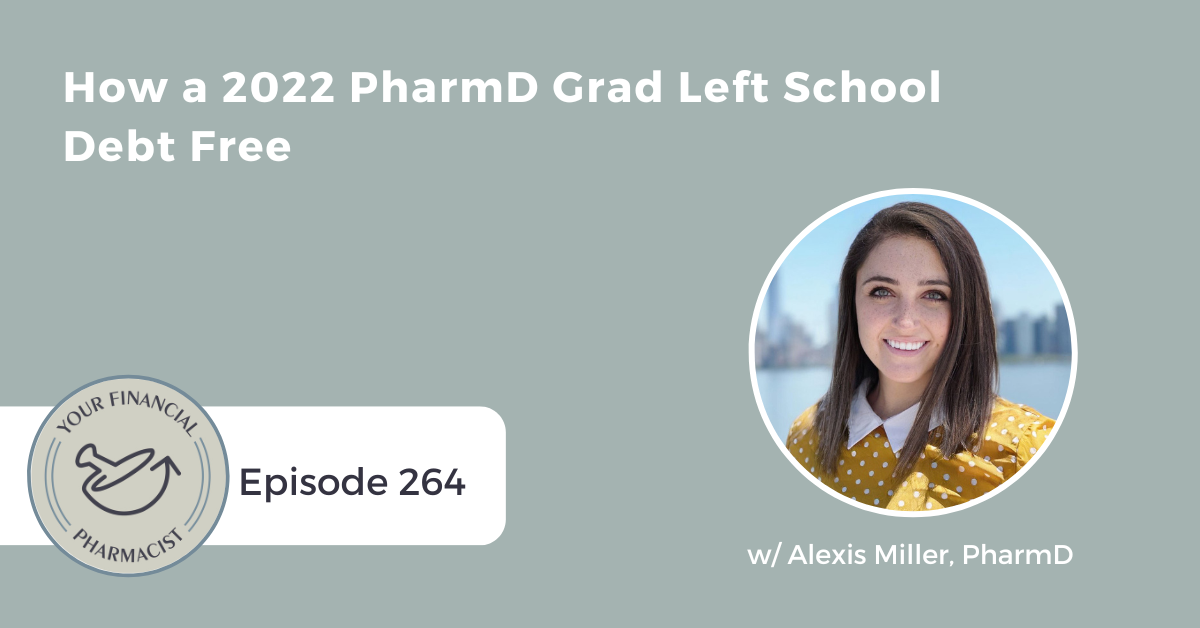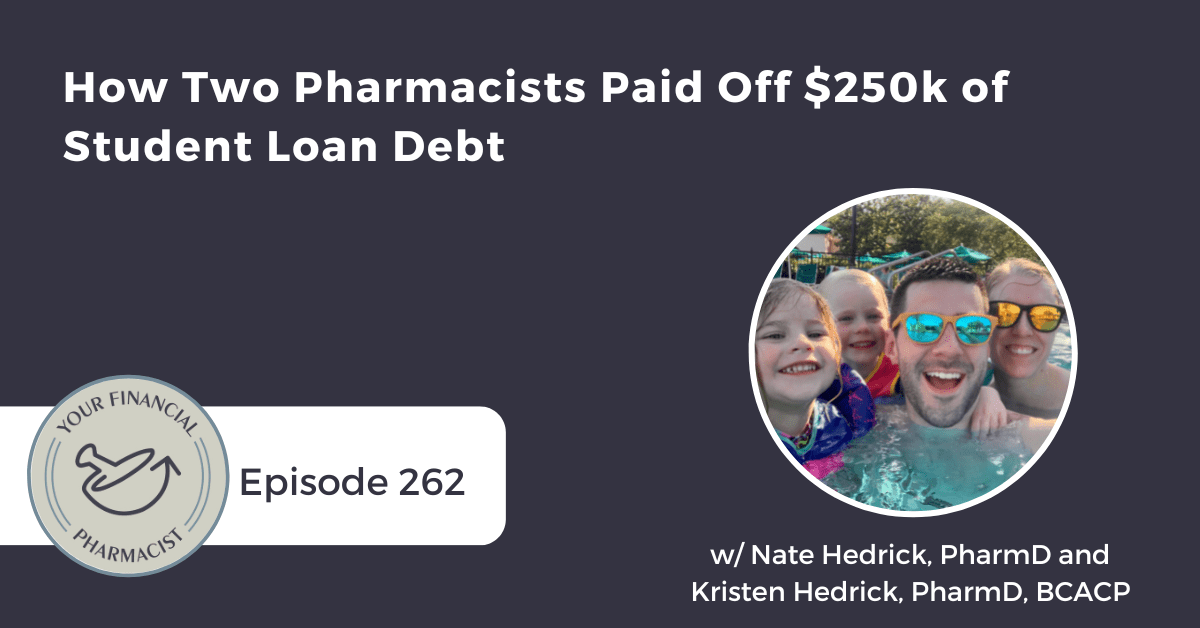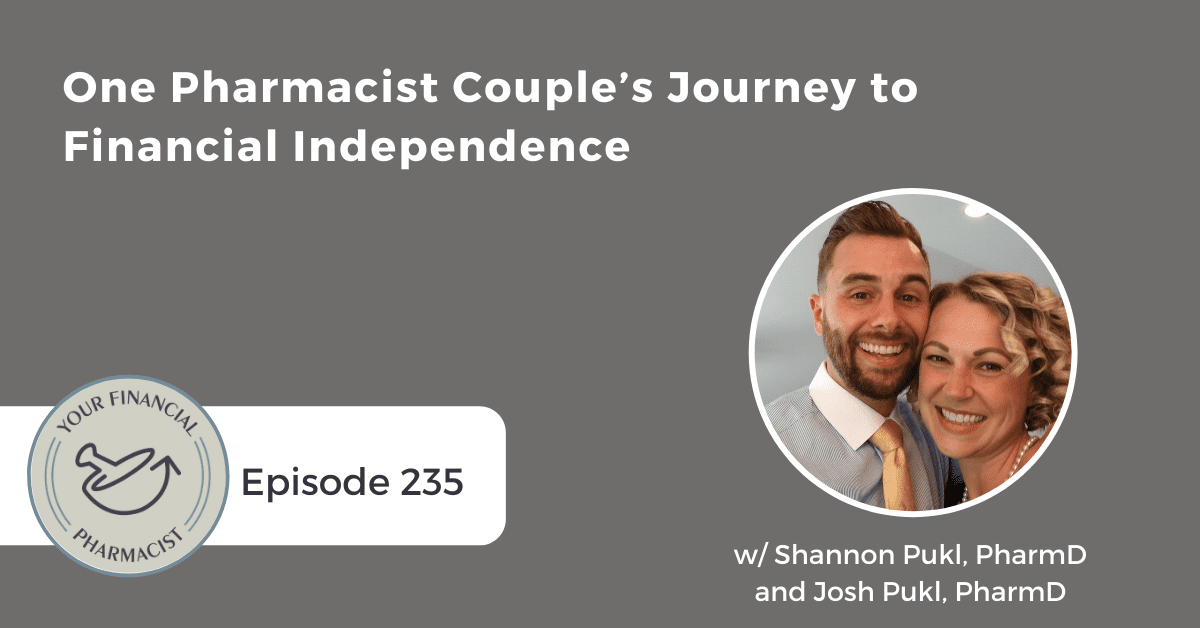Derek Schwartz, PharmD, returns to talk about his debt free journey and his path toward FIRE: Financial Independence, Retire Early.
Episode Summary
On this episode, we check back in with Derek Schwartz, PharmD, on his debt free to FIRE journey. Derek was an early guest on the podcast back in 2017 when he was working toward becoming debt free by ambitiously paying off $180,000 in student loan debt.
Today, Derek returns to share a life update after successfully eliminating his student loan debt – from getting married to owning a home to becoming a father of two – Derek explains how he continues to save and view spending and how his journey toward an early retirement evolves as he pursues FIRE. Derek shares encouraging advice for new grads and anyone looking to pay down debt and what it can mean when you are truly financially free.
About Today’s Guest
Derek Schwartz, PharmD, RPh is a 2014 graduate of Ohio Northern University Raabe College of Pharmacy who currently works with the Kroger Company in the Cincinnati, OH area. After graduating in 2014 with over $180,000 in debt, he paid it off in March 2018. Derek and his wife, Jessica, married in October 2020, and have two children: Julia, age 2, and Calvin, 8 months old. The family of four have a happy and busy life in Cincinnati, Ohio.
Key Points from the Episode
- Financial independence and retiring early with a guest from 2017. [0:00]
- Debt repayment and financial independence with a young family. [2:04]
- Budgeting and financial goals with a focus on breathing room and flexibility. [8:46]
- Financial Independence and Retire Early (FIRE) journey with Derek Schwartz. [13:13]
- Financial independence, debt management, and retirement planning. [17:20]
- Retirement planning and debt management. [20:49]
- FIRE (Financial Independence Retire Early) journey and determining the FI number. [27:44]
- Paying off student loans and saving for the future. [31:49]
- Investment advice and updates from a guest. [37:49]
Episode Highlights
“So my debt repayment that it finished was March 30 of 2018. So just in a couple of days, it’s been six years, which is just crazy. Because it’s been so long, it was such a big part of my life. And it’s so far in the distant past, I hardly think about it anymore. And that was always the goal for paying off that debt because it sets up everything else so nicely.” -Derek Schwartz [3:07]
“When you have that much debt, it stops you from saving, it stops you from investing, it stops you from using your income to benefit future savings, having fun, just doing anything.” -Derek Schwartz [5:40]
“Having that much debt and trying to do other things, is like trying to run a marathon without stretching. You’re not gonna get far, you’re not going, you’re gonna get hurt, you’re gonna have to restart, and then you get to go back to square one.” – Derek Schwartz [5:58]
“And once you are completely out of debt, it’s like shutting a book and just tossing out the window. It’s done. You don’t have to go back.” -Derek Schwartz [6:20]
“And that was the motivation for such a rigid budget is I knew exactly when those loans would be paid off. And now it’s completely changed. Because when you’re talking about no debt, what are you saving for? What’s your goal? You can be so much more flexible, when there’s not some restraint of I’m budgeting to get over this, instead of I’m budgeting to get to this.” Derek Schwartz [11:06]
“But it’s just always been a passion for both of us because we have so many more interests that aren’t tied to our jobs. We both love our jobs, we love our work. But, we love other things, too.” -Derek Schwartz [18:28]
“So we’re planning for those to just not be there. And so that’s kind of a, a different way to look at it. Because most people will assume that Social Security will be there, they’ll have some some kind of health insurance. We’re looking at it as, hey, if we retire at 50, on our own, can we do it?” -Derek Schwartz [22:50]
“And that’s, that’s such the nice thing about being in the FIRE mindset of, first of all, being in the FIRE mindset, you’re out of debt. And then secondly, how can we use factors around us to benefit us. And that’s something you can’t do when you have when you have a lot of debt, and you don’t have the the FIRE mindset if you’ve already been saving.” -Derek Schwartz [26:45]
“So, and we couldn’t do that without being out of debt. I keep going back to getting out of debt. But that’s just so important because it just allows you to be on that platform to just do so many different things with what you want to do with your money.” – Derek Schwartz [34:22]
“Paying off debt is not fun. It is not glamorous, it is not full of constant rewards. You’re not doing a lot of things; you’re just watching a number go down. And that’s all it’s doing. But once you get out and pass through that, your options just expand so much.” – Derek Schwartz [36:18]
Links Mentioned in Today’s Episode
- YFP 014: Turning Student Debt Frustration Into Action
- YFP/APhA Webinar: Money Moves: How to Evaluate Benefits Packages and Job Offers (With Live Insight on Real Pharmacist Job Offers!) on April 17, 2024
- YFP Planning
- Subscribe to the YFP Newsletter
- Tim Ulbrich on LinkedIn
- YFP on Instagram
- YFP Facebook Group
- YFP Disclaimer
Episode Transcript
Tim Ulbrich 00:00
Hey everybody, Tim Ulbrich here and thank you for listening to the YFP Podcast where each week we strive to inspire and encourage you on your path towards achieving financial freedom. This week I welcome back Derek Schwartz, a guest from episode 14 way back in 2017 to share his journey from PharmD to debt free to pursuing financial independence/retire early. We discuss why he and his family are on the fire path, how his financial decisions, post-graduation helped put them on a path towards building wealth, the biggest challenges that they’re facing in pursuit of fire, and how he striking the balance between living a rich life today and saving for the future.
Now, before we jump into the show, I have a question for you. Have you ever wondered how to evaluate the benefits package and offer you receive once you’ve landed the job? If so, our upcoming webinar supported by APHA is for you. On Wednesday, April 17, at 8:30pm. Eastern my partner in crime YFP, Co-Founder and Director of Financial Planning, Tim Baker is hosting a free webinar titled: Money Moves: How to Evaluate Benefits Packages and Job Offers. During this webinar, Tim will dig into the valuable connection between career and finance and the ins and outs of benefit packages and offers. He’ll teach you how to navigate components of employer benefits, including insurance, FSA, HSAs, employer sponsored retirement accounts, as well as help you understand components of a job offer and how to evaluate one. Plus, Tim is going to do a live walkthrough and evaluation of real pharmacist job offers from you, the YFP community. So send us your pharmacist job offer current or past to [email protected] with the subject line: job offer. Don’t worry, we’ll keep these anonymous. And if you attend live, you’ll have the chance to win a $50 Amazon gift card or YFP bundle which includes a YFP t-shirt and our four books published at YFP. To save your seat and to register visit yourfinancialpharmacist.com/offer. Again, that’s yourfinancialpharmacist.com/offer.
Alright, let’s jump in my interview with Derek Schwartz.
Tim Ulbrich 02:02
Derek, welcome back to the show.
Derek Schwartz 02:04
Great to see you again.
Tim Ulbrich 02:06
So excited to have you back. This has been a while in the making. For our community to know we had Derek on way back when, nearly seven years ago at this point, Episode 14, September 2017. We talked about your journey – graduated from Ohio Northern University in 2014. Go Polar Bears!
Tim Ulbrich 02:23
You were paying off $180,000 of debt in just about four years. That was 2018 when you guys finished that debt repayment journey. We’ll link to that episode in the show notes so folks can go back. And we’re going to talk a little bit more about that. But really focus on your journey now and where you’re at present day and how you and your family are on this path towards financial independence. So Derek, since it’s been such a while, 2017 what what’s changed since since we last spoke?
Derek Schwartz 02:23
Go Polar Bears!
Derek Schwartz 02:51
Man, what hasn’t changed? So when we recorded the podcast, and I begrudgingly listened to it. So I think I join everyone that they don’t like to hear themselves talk. So I, I struggled through that I had not paid off my debt when I recorded that. So my debt repayment that it finished was March 30 of 2018. So just in a couple of days, it’s been six years, which is just crazy. Because it’s it’s been so long, it was such a big part of my life. And it’s so far in the distant past, I hardly think about it anymore. And that was always the goal for paying off that debt because it sets up everything else so nicely. So you know, it’s a typical story, you know, you, you meet someone, you get engaged, and my wife and I got engaged in January of 2020. And I was like, you know, this is gonna be a great year. Nothing bad’s gonna happen in 2020. It’s gonna be smooth sailing from here, as everyone knows, wasn’t the case. But it was an opportunity for us to buy our future home, we moved into a good part of town where we wanted to raise kids, and then we started the family. So we have two kids. I have a two year old daughter and an almost an eight month old son. So things have been great so far.
Tim Ulbrich 04:13
That’s a lot in a short period of time, as we often see, with new practitioners coming out, you know, you’ve been out now a decade coming up here, right this spring, but you know, you graduate, start your first job, get married, you’ve got a couple of kids, pay off your loans. I mean, just a lot that happens and one of the things I was sharing with you before we hit record, which I think is a great example here, Derek and the work that you and your family have done is you know the decisions we make in that first five to seven years is the window I often talk about this transition right from student to new practitioner, really is so critical to setting the foundation upon which we can build and we’re going to talk about how now you guys are on this path towards financial independence, which I presume is probably not possible or possible to the degree that it is. If you didn’t work hard to put some of those rocks in place some of the foundational pieces in place early on in your journey. And so, you know, again, we’ll link back to that episode so people can hear the details of that debt free journey, but just remind us of the motivation, the why behind a pretty aggressive debt repayment $180,000, about four years. Everyone’s on their own journey, everyone feels different about their debt. But for you guys, obviously, it was in a decision to be intentional about paying it off in a short period of time, which again, has led to the place that you’re in today, why why was that such an important piece of the plan for you guys to get out of that debt as quickly as possible?
Derek Schwartz 05:40
I think it was, because there was no other option. When you have that much debt, it stops you from saving, it stops you from investing, it stops you from using your income to benefit future savings, having fun, just doing anything. Having that much debt and trying to do other things, is like trying to run a marathon without stretching. You’re not gonna get far, you’re not going, you’re gonna get hurt, you’re gonna have to restart, and then you get to go back to square one. So the goal of getting out of debt was just to get past that. So that options, were actually on the table that were available. And once you are completely out of debt, it’s like shutting a book and just tossing out the window. It’s done. You don’t have to go back.
Tim Ulbrich 06:27
Yeah, and I think, you know, I often shared Derek that when I think back to my journey, Jess, and I have paid off a couple $100,000 of debt and making every mistake you can make along the way. You know, it was really when our kid most of that journey was before we had kids and the end of that journey. Our kids were very young. But I now think about that monthly payment, right that we were making, which was pretty aggressive at the time. And basically, as I now see the expenses with kids rising, right, which is natural, you know, I’ve got some older, older boys that are starting to eat us out of the house. But you know, for other people, it’s daycare, right? It’s other costs, it’s saving for kids college. But the point being that, you know, that payment that I think of that we’re making towards their student loans, you can pretty much just put that money over to expenses, right, that are associated now with having young children that weren’t there before. And for us, I know, personally, it would be a burden currently if we were still trying to work through those payments, while other expenses were rising. Does that resonate as you guys are, you know, obviously, growing a young family, you know, having that margin through having that debt paid off has allowed you to really have have some more flexibility as naturally expenses will rise as you have young children.
Derek Schwartz 07:37
Yeah, for sure. And we we started with our daughter in daycare. And we quickly learned that wasn’t for us. We were getting a lot of sick calls, we had to go in, bring her home, my wife and I both worked full time. And we were seemed to be a some of us, one of us is going to have to work part time to have to get around daycare. So we’ve hired a nanny, which was the best decision that we made. And, you know, we couldn’t afford that with student loan payments, we couldn’t afford that with a credit card payment or a car loan, or anything that, you know, requires a monthly payment like that. So it’s the setup to getting flexible with the budget has to start with being in a position where you can be flexible. And without any, like debt that’s just holding you down. That flexibility is just gone. So it limits your options. And we don’t want to have to, you know, talk about every single transaction that we do, where we buy something. Like hey, can we afford to have a date night? We don’t have to have that discussion because we don’t have, you know, all these loans and like this massive budget that we have to worry about. We still budget, but that’s in the budget, so you don’t have to think about it.
Tim Ulbrich 08:52
Yeah, yeah, what I hear there, Derek, is breathing room, right? You’ve used the word options, flexibility a couple of times already. But when you have breathing room, we underestimate the mental space and clarity that can come from that. And, you know, I think you can probably appreciate this working on this topic together with your spouse, like a lack of breathing room, a lack of margin is a recipe for stress and arguments. And you know, not not being on the same page financially. Right. So creating that breathing room, which we know is easier said than done. We look at today’s graduates are coming out with $150- $200,000 of debt. You know, you and I were fortunate to not necessarily be buying a home where home prices are in 2024 and interest rates. There are headwinds, right that today’s graduates are facing that are real. And unfortunately, those eat into that breathing room, they eat into that margin, but we know when we can create that breathing room and space. We have options. We have flexibility, you know, we’re able to really progress and move forward with the financial plan and play offense instead of constantly being on our heels playing defense. I do want to poke for a moment on the budget because I think that’s something that, you know, when I talk about budgeting, you know, to a group of pharmacists, you know everyone again is on their own journey, but I often see the look of like, like, do I have to right? Do I have to track? Do I have to do these things? And I tried to reframe the budget as being the really the mechanism by which we’re achieving our financial goals. Now, how detailed do you want to get is up to you. Whatever works for you, and everyone, again, is going to be different. But if we reframe it, that the budget, the spending plan, the system, whatever you want to call it, is simply the execution plan for achieving our goals, I think we can get behind that a little bit more. And you made a comment that, hey, we’re, we’re budgeting, but we’re maybe not tracking things at the granular level of hey, can we go on a date night tonight or not? And is the budget $20 or $30, or whatever that number is. So tell us about what your budgeting system looks like right now. And maybe how that’s evolved over time.
Derek Schwartz 10:46
Yeah, the budget before when I had debt was so rigid, because I knew exactly how much I was making. I knew exactly how much was going to, at the time was living in an apartment. So rent utilities. And it was a very locked in number. And that’s what it was going to be every month. And that was the number that would, that would knock down that debt. And that was the motivation for such a rigid budget is I knew exactly when those loans would be paid off. And now it’s completely changed. Because when you’re talking about no debt, what are you saving for? What’s your goal? You can be so much more flexible, when there’s not some restraint of I’m budgeting to get over this, instead of I’m budgeting to get to this. And when you’re budgeting to just have that independence that you want in your life financially, you can be so flexible with it. And my wife and I, before we had kids, we were saving a ton of money, I want to say at least 40 to 50% of our income, we were saving that. Because we were in a position where we’re like, hey, we want to have kids. So we know the timeline that we want to be on, we wanted to have a couple of kids we wanted to family, we knew it was going to be in a couple years. So we’re like, you know what, let’s just save for the next couple years, and then put ourselves in a position. So we just saved super aggressively. And then when the kids came and expenses come up, and you you dial that budget back, it doesn’t hurt as much because you’re still saving. And when you’re so aggressive to start, it’s so much easier to for it to be malleable, just mold it what you needed to be. And then we then look forward to having goals of hey, we can we can get that back to where we want it once kids are in school. And once you have less expenses, because they’re both we had two under two for quite a long time and not only was financially stressful, just in general stressful. And it we we see where it can get back to and that’s the motivation now.
Tim Ulbrich 12:46
Yeah, and I think Derek, one things you share that resonates with me is because of your early aggressive savings, we’ll talk about more of that here in a little bit with your FIRE journey. You know, that gives you some permission to say, Hey, this is a season we’re in. This is a season of expenses, you know, may not be forever, it’s gonna look different in a few years. You mentioned that already. But let’s say the opposite was true. Let’s say you guys didn’t save it all in the first five, seven, now 10 years, a decade coming up on graduation. That’s another layer of stress, right? Because, hey, we’ve now got rising expenses. And we feel like we need to play catch up. And because you saved early in the journey, there probably isn’t that nagging feeling of hey, we’ve got to catch up. Right. So again, breathing room, and margin. So our theme for today is PharmD to Debt Free to FIRE. So again, graduated 2014 Debt free journey – paid off those student loans in 2018. Now you’re really on this path and evolution towards building wealth and towards financial independence. We’ve talked about FIRE on the podcast many times, we’ve got a lot of resources on their website, if that term is new to those listening: Financial Independence, Retire Early. So we’re going to spend a bulk of our interview talking through that with Derek what what does that mean to him? Where is he at? And the journey? Why are they on the fire journey? And what has that looked like practically for them and their family? So, Derek, let me start there. It seems that the the term FIRE while there’s formulas, calculations, all these things about how we can determine what our FI number is, I recognize that can mean something different to everyone. So what does FIRE mean to you and to your family?
Derek Schwartz 14:18
For us, it just means that we retire on our own terms. We both had the goal of retiring when we were 50. That’s the goal. And because I love my wife, I will not say how old she is on a podcast. I am 34. That means I want to retire in 16 years. By the time I’m 50, we are done working and we want to pursue other interests. The nice thing about being on this FIRE journey and being aggressive with saving when we did is with two kids, we looked at each other we’re like, hey, this might be 55 now. that’s still really early. Hey, we might push it back to like, you know, 57-58. Maybe 60, we work part time that’s still early. The the financial independence side of the FIRE to us just means, hey, we’re on our own terms. If we want to pursue other interests, we can do that if we want to, you know, scale back how much we’re working, we can do that. If we want to explore other interests that can make us money, we can do that and just leave our professions that we have behind. But once we get to that point, we’ll know that we’re covered financially. And then you know, the sky, the sky’s the limit from there where we can, you know, instead of diversifying your your money, where it’s going, diversify your interests and see what you know, what calls for you.
Tim Ulbrich 15:40
Yeah, what I really hear there, Derek is options and opportunities that you could pursue, and it might be one of many different pathways. Maybe you decide to work part time, maybe you don’t, maybe decide to travel a bunch, you know, maybe there’s grandkids at that point in the future, and you want to have the flexibility of time, like, you know, maybe it’s something that you’re not even thinking about at this point, whether it’s volunteering, and you know, there’s a ton of different things that could be, but having the option to, right, that that is what really resonates with me when people talk about financial independence, regardless of what the number is, or what the age is, is, you know, maybe it’s retire early, maybe it’s not. But there’s options to pursue A, B, C, D E. I talked with somebody recently on the FIRE journey, I guess, we’ve had on the podcast before Corey Jenks. And he gave an example of, you know, I think he referenced like walking into a sporting goods store or another type of business. And he was like, Oh, that’s interesting. Like, maybe someday I just would want to try to work at one of these and kind of see what it’s like. And when you’re on an FI pathway, like, those are the kinds of things that you can, quote, take a risk on or roll the dice and say, oh, this would be interesting to do for, you know, six or 12 months, whatever that might be. So I love what you’re sharing there. One of the barriers I often see, Derek is two individuals getting on the same page, not just in general with their finance. But here’s we’re talking about with FIRE. And you know, often you might have one person who’s gung ho, let’s go. And maybe they even started the FIRE journey before they met their significant other, spouse or partner. So my question for you is, have you guys always been on the same page? Has this been an evolution, it sounds like you’re very much in the shared vision of 50, or 55-57. Whatever that age is. Tell us more about how you’ve been able to work together and get on the same page.
Derek Schwartz 17:25
Yeah, I’m, I am so blessed to have my wife. Because on our first date, we talked about just being financially independent, that was just such a goal for both of us. Probably weirded out a lot of people were sitting by at the restaurant we were at. But that was just a goal for both of us. She was debt free when I met her, she owned her own home, she wanted to get into real estate, she was already on that path I had, you know, my path is so much different from hers, because I had all this debt I had to pay off that she still had some, but she had paid it off years before I met her. So we were on the same journey of getting to financial independence. But we started completely different areas, and we just happen to meet at the time where, you know, I was ready to start saving at the level that we wanted to. So at the time we met, I was talking about, you know, buying my first home, eventually, we as we dated, I kind of weaseled my way into her house, decided to just live there and pay her rent and then we got married from there. But it’s just always been a passion for both of us because we have so many more interests that aren’t tied to our jobs. We both love our jobs, we love our work. But, we love other things, too. And part of that is with our kids, we want them to be also financially independent. And that’s you can’t do you can’t preach that you’re not doing it. And that’s just that’s really that’s a hard place to be in of you know, teaching discipline with your kids and teaching, you know, financial independence and you know, being your own person and not you just you know, having so much debt that you can’t, you know, do the goals that you want to do.
Tim Ulbrich 19:10
Yeah, and I appreciate the perspective you have on that Derek and I know you’ve got young ones you mentioned the the ages a little while ago. One of the things I’m appreciate with my boys, my oldest now going to be 13 in the summer, as they are observing and picking up on things way younger, you know, then you would think. Sure, they might not be able to articulate it. But there is definitely a culture in the house around money. They become very aware of how individuals are talking about money. Is it you know, fearful? Is it stressful? Is it an open conversation? Is it a closed conversation? And we’re gonna be talking more about that on the podcast here in the future about kids and money. It’s a really, really important topic. But you know, I think just a note of encouragement to parents out there like hey, we’re not going to get it right all the time. I haven’t gotten it right. Jess and I haven’t gotten it right all the time. But, you know, really being cognizant and aware of the dialogue, the culture, the tenor, the tone of what’s happening financially in the household. I think it’s so important. Derek, you mentioned 50. And I heard that evolve 53, 55, 57. You know, when I hear that age, often an objection that will come up is, well, how are we actually going to be able to fund that, right? You know, we’re not yet at Social Security age, you know, maybe we’ve got dollars that are tied up predominantly in traditional retirement accounts, 401k, 403B’s, IRAs can’t access those to 59 and a half without penalty. You know, so then becomes this question of, well, how do we actually produce a paycheck when we’re at an early retirement age, and of course, all the fears that may come of hey, we’re gonna run out of money too early, and where we need health insurance benefits. Talk to us about how you guys are thinking about that, while still a ways away. I’m sure it’s something that’s been on your mind.
Derek Schwartz 20:49
Yeah, that’s, that’s something that we, that one of the first things we talked about as, hey, if we retire at 50, what do we do? So we have different accounts that, you know, you can’t touch certain retirement accounts until a certain age, we also have taxable accounts that we can dip into. We have money that’s set aside just in savings that we can get to at anytime. By that time, we we have a 15 year mortgage, so our house would be paid for. So it’s kind of just like leveling with what do we have to anticipate paying for? What to what accounts can we get into what can’t we get into? What does that mean for hey, if we retire at 50, are we actually retired? Can we do all the things we want? Or do we have to kind of like, play it slow a little bit until we can get into into some more taxable accounts that we’re holding on to? And, you know, it’s flexible. And we’d rather have that conversation to 50, than than 70, or 75. So it’s kind of a non answer, it’s almost a we’ll see when we get to it. And that’s why it’s so nice, just for it to be so flexible, because we don’t know, you know, what that looks like at 50. And then, you know, if, like, we have to say, hey, we’re gonna work till 55 now, that’s not a big deal. And that might not even be a full time at that point. That might just be like, you know, hey, we’re both working part time both our kids are, you know, 18, maybe out of the house and college, maybe they’re doing their own thing, you know, and we can downsize our house, there’s a lot of options that you can have. So, another thing that we look at is, instead of saying, hey, at 50, what do we do? We’d rather do that and say, hey, we’re, we got to 65, Social Security is not there. Hey, we’re not getting the health insurance we thought we’d get because you don’t know what things are going to be. And with all those variables that are so many are out of your control that you don’t know. So we’re planning for those to just not be there. And so that’s kind of a, a different way to look at it. Because most people will assume that Social Security will be there, they’ll have some some kind of health insurance. We’re looking at it as, hey, if we retire at 50, on our own, can we do it? And we think we’re on track to do that. But if we have to push it, we can push it.
Tim Ulbrich 23:12
Yeah. And what I hear there, Derek, is being comfortable with the uncomfortable and the unknowns, but not necessarily just kind of put your hands up and saying, hey, there’s not planning that can be done, right. You mentioned several variables, assumptions that any one of those can change, some of them will change, some of them may be better than you thought, worse than you thought. So there’s planning that needs to be done. And we so often talk about the accumulation phase. Right. But we don’t often talk about the de-cumulation phase. Whether that’s early retirement or not, you’re gonna have several of these buckets of assets, right? You mentioned brokerage accounts, you mentioned traditional accounts, you’ve obviously got your home, that will be an asset, perhaps there’s real estate now or in the future. I mean, you’re gonna have all these different buckets, maybe there’s social security involved. And it’s a matter and function of okay, well, for 55. Where are we drawing from those? And how do we do that in a tax efficient way? And how do we make sure that we’re optimizing which buckets we’re drawing from, and essentially, what we have to do is, you know, our working career, we work and we get a paycheck, right? Well, when we’re not working, or working part time, and we need to fill up the rest of that income bucket, we have to produce our own paycheck in retirement, whether that’s early or not. And I think there’s so many nuances and planning opportunities there that we just don’t talk enough about how do we actually produce that retirement paycheck? You mentioned 15 year mortgage. I want to talk about that for a moment. Because, you know, obviously, you’re, you’re a math guy, you’re on the FI journey. And, you know, there’s this debate that’s always ongoing of 15 versus 30. Year and what’s the opportunity cost and, you know, getting out of debt and versus carrying a low interest rate debt for a longer term. As you’re someone who’s looking at an aggressive savings rate, you know, an argument could be made potentially that hey, anything you’re paying on a 15 year that you could, you know, have paid on a 30 year or lesser amount than you could have invested the difference. You know, obviously there’s an opportunity there to way of paying down the debt versus investing for the for future, the most common question we get, hey, should I be paying down my debt? Should I be investing? How did you think through that process of, hey, let’s make a higher monthly mortgage payment. And therefore, you know that that is money that could have potentially been invested versus maybe you did decide to take out a 30 year, and it’s a lower amount, but you’re able to invest more talk us through that.
Derek Schwartz 25:20
Yeah, that’s an interesting story, because we bought her home in the summer of 2020. And taking, taking some time to look back on that time in the mortgage arena, we got a 3% fixed interest rate. You’re not getting that anytime soon, anywhere else. So we made the decision of hey, like, this is an interest rate that it’s basically non-existent. 3% it’s is absurd, and especially in today’s market. So a 15 year mortgage, that’s not really that much of a difference between a 30 year and then you also you still have something like wiggle room to, you know, take some money on the home, and do that sort of things. And it’s funny, what do we do that now, probably not. It would probably be a 30 year, if we were to move and buy a new home. It would probably be a 30 year mortgage. And it’s just interesting, because when you’re out of debt, you look at different ways to I don’t want to say manipulate what you’re doing with your money, but to just kind of be flexible with it, is that instead of saying, Hey, we have to, you know, think of a different way we’re paying on our home, we might have to think of a different differently. We think of it in a way of, you know, how can we take advantage of the situation that we put ourselves in, we were both out of debt, we bought our home? How can we make this situation benefit us? And that’s, that’s such the nice thing about being in the FIRE mindset of, first of all, being in the FIRE mindset, you’re out of debt. And then secondly, how can we use factors around us to benefit us. And that’s something you can’t do when you have when you have a lot of debt, and you don’t have the the FIRE mindset if you’ve already been saving. And that’s not a realistic expectation for people right now. But if you set yourself up to be in a position where you want to be FIRE, and you want to be really aggressive retiring, that is a situation that anyone can easily be in.
Tim Ulbrich 27:24
Yeah, I appreciate that. And I presented the question as a dichotomous variable of hey, you could have either taken out debt longer invest that, of course, it’s not that simple. And one of the variables that’s unique to you guys, is you did aggressively save early on. So there already was that that base of savings. You know, if someone isn’t in that position, and they’re weighing, you know, should I be taken out a longer term mortgage or shorter term? And where am I investing? The question they have to factor in, among many others is, am I on track? Am I ahead? Am I behind? And, you know, certainly that will, will change the equation, how we look at that, as well. When you guys came up with your FI number, I’m curious to hear more about how you determine what this is and how you evaluate this on an ongoing basis, you know, in the FI community, which you’re more plugged in than I am, but there’s everything from back of napkin, you know, rule 25: take your total annual expenses, including taxes multiplied by 25. That’s based on the 4% rule. We’ve talked about that on the show before. And then there’s, you know, much more nuanced calculators that are out there and available. So tell us more about how you guys have evaluated what your FI number is?
Derek Schwartz 28:28
Yeah, we’re much less we’re not even that nuanced. We just, we pick a number, hey, 50, what do we need to do to get there? And that wasn’t a let’s calculate what we have what we’re saving it, plug it into something. And that’s what the number comes up. We started our FIRe journey being like, it’s going to be 50. What do we need to do to get there? And I think, looking at that way, it simplifies it a lot more, because you look at it from a perspective of, if that’s the goal, all right, um, when we started, that was a couple years ago, so it was like 18 years to 50. What are we doing in the next 18 years to get there? And at that point, we didn’t have kids, and then kids come, and we’re like, alright, 50 might not be possible. We went to push it, but 50 it still could be possible. What can we what can we cut back on a little bit to get there? So I think that’s such a nice thing about FIRE is that, you know, it, it’s so adaptable to what you want to do. You can it can be 55, it can be 60. It can just be an unknown age, where you just you have your, your budget, you look at it, you look at what you’re saving, and you’re like, yeah, we can just do it now. And then just start your, you know, FIRE journey from there. Yeah, an important thing and for those that are new on this FIRE journey, what you’ll quickly realize is you start to run numbers is your annual expenses is, is really the factor that’s going to drive this equation the most both in terms of what you need, right? Because your projected need is based off of what you’re going to have to potentially draw. So if you have two pharmacists, let’s say both making $125,000, one is able to live off of 50% of their income, one’s able to live off of 80% of their income, their FI numbers are going to be very, very different. And thus, their savings rates are going to be very different because of the percentage of their income, right, that’s available and able to say, so easier said than done. You know, we know that pharmacists cost of living, individual situations, but you see this on the regular where you know, someone who’s able to really drive down cost of living expenses. And there’s a balance here that we have to factor in, versus someone that is not able to for whatever reason, those numbers of what that FI number is going to be in the timeline to get there are going to be drastically different for sure. Derek, one of things we talk a lot about on this show is we firmly believe from personal experience and working with hundreds of pharmacists, one-on-one on this topic that a good financial plan, it’s a marathon, it’s not a sprint, we really have to be striking this balance between, yes, we have to be ready for the future. Yes, we have to take care of our future selves. But we also have to be making sure we’re prioritizing living a rich life today. And we tend to think about these on one end of the spectrum or the other. Right, there’s some that we see are very, very aggressive savers. But aren’t necessarily comfortable with spending in any capacity. And then there, of course, is the opposite end of the equation as well. How have you guys been able to, especially with a young family, strike this balance between, hey, we need to continue to push forward with getting our FI number. And whatever that age and goal is, but also like, hey, this is a season in a phase of life, that we also want to make sure that we’re living a rich life, we know that eventually this season will pass as well.
Derek Schwartz 31:49
Yeah, that’s, it’s always something when you have kids, everything changes. And you know, everyone’s gonna tell you that you don’t believe it until you’re in it. And that’s something that, you know, you want to enrich your kids lives with different experiences and do things. And, you know, we’ve talked about, hey, we could take them to Disney World, we can take them on a nice vacation, we could also go to a national park. There’s a different cost difference with those, especially if you can like drive to one. We live in Cincinnati so we’re close to Mammoth Cave systems, Red River Gorge in Kentucky, it’s a really nice places that you know, the kids will enjoy. And that’s a big cost savings as opposed to like a more expensive vacation like Disney. Nothing against Disney, my daughter loves frozen, she will eventually go. But that’s something that right now with, we have more expenses, because we have two very young kids, we have a nanny that we’re paying for. Once they’re older, and they’re in school, we don’t have the the nanny costs, some of that costs goes towards maybe a new car fund, maybe that goes to vacation funds. So we can do like a yearly vacation somewhere nice. That goes back into retirements, and it just kind of like just kind of morphs, it’s kind of like a primordial soup of just the funds are there. They’re being used for this, they’re being used for that. What can we do now to make sure that, hey, when the time is right, we can afford that vacation, we can afford to take them on, like really, you know, fun, like family trips to like Disney. And right now that looks like you know, more affordable options, we take them to the Cincinnati kids museum, which is a great place for kids, we take them the national parks. And those are so much more affordable and fit within our current FIRE budget without, you know, just sitting at home and not doing anything. So it’s, it’s in terms of what you do with family enrichment, it depends on what you want to do, how much you’re paying now for expenses that won’t be there. And for us, we have expenses of a nanny that won’t be there for too long. It’s going to be here for a couple of years. But then after that, it’s like okay, we’re gonna go back to saving more aggressively. How about we also save aggressively for a nice trip, How about we save aggressively for, you know, programs that we want our kids in? So, and we couldn’t do that without being out of debt. I keep going back to getting out of debt. But that’s just so important because it just allows you to be on that platform to just do so many different things with what you want to do with your money.
Tim Ulbrich 34:37
Great stuff. My last question for you, Derek, is you know, for the for the students or new grads that might be listening. They’re saying, Derek, this is great. But dot dot, dot, I’ve got $175,000 of debt. I’m trying to purchase a house in this housing environment where costs are crazy. Interest rates are crazy. And I feel like there’s not a whole lot of margin and sure, maybe I’d like to pursue a FIRE journey. But at a minimum, I’d like to just build a good foundation and make sure that I’ve got a solid plan. What advice would you have for new grads coming out today in 2024? As you look back now 10 years ago, just a different space that we’re in. What are your thoughts for those new grads coming out today?
Derek Schwartz 35:17
Yeah, it’s, you have to realize what goals you want to accomplish first. Some people want to own a home. I’m not going to tell people to not buy a house. Some people want to start a family and never going to tell people to not have a family. When you have a lot of debt, and unfortunately, with a lot of pharmacists, pharmacy students coming out, the grads and some people do residencies, where they’re not making their like full salary yet. It’s hard to say to someone, hey, you know, you got to really get on that debt and get that down. From what I saw, when I started my journey of paying off my debt, I was working with a lot of older pharmacists, that when I was in my like, early 20s, and a lot of them were like, hey, if I was, if I could go back 30 years be in your shoes, I would do exactly what you’re doing. And that’s the affirmation that I needed that I was on the right path, because it wasn’t fun. Paying off debt is not fun. It is it is not glamorous, it is not full of constant rewards, you’re not doing a lot of things, you’re just watching a number go down. And that’s all it’s doing. But once you get out and pass through that, your options just expanded so much. And there are some people that you know, graduate, they already have a family, they already have a house. That requires you know, a sit down with your spouse, your partner, and talking about a budget of hey, you know, how can we get this down? How can we get to where we need to go? Yeah, and the first step that I would encourage is to budget and figure out a number of like, when is the realistic goal we can pay it off? And I think figuring that number out, for some people might be longer than they thought it would. And that’s a really important step is to figure out, look at all of our expenses, maybe you have a mortgage, you have the expense of kids, you’re thinking, hey, you know, we can knock this student loan down in a couple of years. It’s actually like 10. Do you want to wait 10 years to pay that off? Or what can you do now to like, chip that number down to five? What can you do to chip it down to six? And then those you know, four or five years you save of not being you know, chained down with your student loans, it can be really reassuring, kind of a kick to get into gear, to get some stuff done.
Tim Ulbrich 37:49
Great stuff there. This has been a joy to reconnect and hear your story. Hear where you’re at seven years later. Hear how the foundation you built early. You’re seeing the fruit of that now and I think there’s only more fruit to come. So thank you so much for taking time to come on the show and to give us an update where you’re at.
Derek Schwartz 38:06
Great to be back.
Tim Ulbrich 38:07
[DISCLAIMER] As we conclude this week’s podcast and important reminder that the content on this show is provided to you for informational purposes only and is not intended to provide and should not be relied on for investment or any other advice. Information in the podcast and corresponding material should not be construed as a solicitation or offer to buy or sell any investment or related financial products. We urge listeners to consult with a financial advisor with respect to any investment. Furthermore, the information contained in our archived newsletters, blog posts and podcasts is not updated and may not be accurate at the time you listen to it on the podcast. opinions and analyses expressed herein are solely those of your financial pharmacists unless otherwise noted, and constitute judgments as of the dates published. Such information may contain forward looking statements, which are not intended to be guarantees of future events. Actual results could differ materially from those anticipated in the forward looking statements. For more information, please visit yourfinancialpharmacist.com/disclaimer. Thank you again for your support of the Your Financial Pharmacist Podcast. Have a great rest of your week.
Current Student Loan Refinance Offers
Note: Referral fees from affiliate links in this table are sent to the non-profit YFP Gives. | Bonus | Starting Rates | About | YFP Gives accepts advertising compensation from companies that appear on this site, which impacts the location and order in which brands (and/or their products) are presented, and also impacts the score that is assigned to it. Company lists on this page DO NOT imply endorsement. We do not feature all providers on the market. |
$800* Loans* ≥150K = $800 100-149K = $450 <100K = $350 | Variable: 5.28%+ APR (with autopay)* Fixed: 5.28%+ APR (with autopay)* *All bonus payments are by gift card. See terms | The "Kayak" of student loan refinancing, Credible displays personalized prequalified rates from multiple lenders | ||
$750* Loans ≥150K = $750* ≥50K-150k = $300 | Fixed: 5.49%+ APR (with autopay) | A marketplace that compares multiple lenders that are credit unions and local banks | ||
$500* Loans ≥50K = $500 | Variable: 4.99%+ (with autopay)* Fixed: 4.96%+ (with autopay)** Read rates and terms at SplashFinancial.com | Splash is a marketplace with loans available from an exclusive network of credit unions and banks as well as U-Fi, Laurenl Road, and PenFed |
Recent Posts
[pt_view id=”f651872qnv”]

